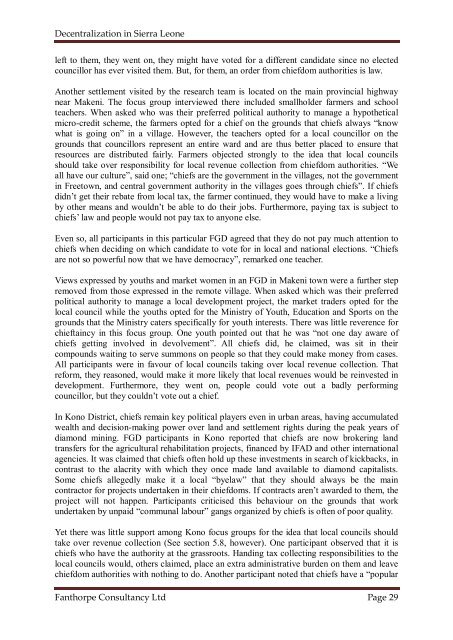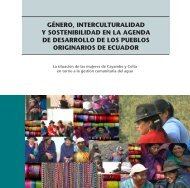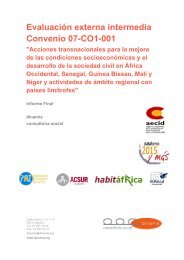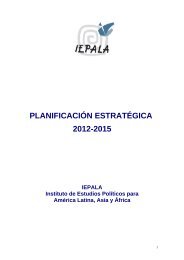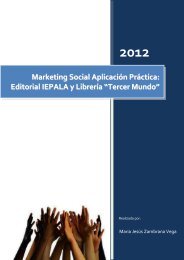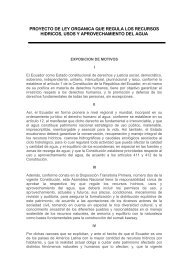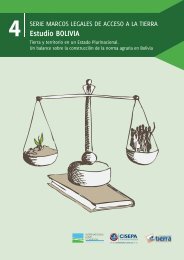Decentralization in Sierra Leone - Research for Development
Decentralization in Sierra Leone - Research for Development
Decentralization in Sierra Leone - Research for Development
Create successful ePaper yourself
Turn your PDF publications into a flip-book with our unique Google optimized e-Paper software.
<strong>Decentralization</strong> <strong>in</strong> <strong>Sierra</strong> <strong>Leone</strong>left to them, they went on, they might have voted <strong>for</strong> a different candidate s<strong>in</strong>ce no electedcouncillor has ever visited them. But, <strong>for</strong> them, an order from chiefdom authorities is law.Another settlement visited by the research team is located on the ma<strong>in</strong> prov<strong>in</strong>cial highwaynear Makeni. The focus group <strong>in</strong>terviewed there <strong>in</strong>cluded smallholder farmers and schoolteachers. When asked who was their preferred political authority to manage a hypotheticalmicro-credit scheme, the farmers opted <strong>for</strong> a chief on the grounds that chiefs always “knowwhat is go<strong>in</strong>g on” <strong>in</strong> a village. However, the teachers opted <strong>for</strong> a local councillor on thegrounds that councillors represent an entire ward and are thus better placed to ensure thatresources are distributed fairly. Farmers objected strongly to the idea that local councilsshould take over responsibility <strong>for</strong> local revenue collection from chiefdom authorities. “Weall have our culture”, said one; “chiefs are the government <strong>in</strong> the villages, not the government<strong>in</strong> Freetown, and central government authority <strong>in</strong> the villages goes through chiefs”. If chiefsdidn’t get their rebate from local tax, the farmer cont<strong>in</strong>ued, they would have to make a liv<strong>in</strong>gby other means and wouldn’t be able to do their jobs. Furthermore, pay<strong>in</strong>g tax is subject tochiefs’ law and people would not pay tax to anyone else.Even so, all participants <strong>in</strong> this particular FGD agreed that they do not pay much attention tochiefs when decid<strong>in</strong>g on which candidate to vote <strong>for</strong> <strong>in</strong> local and national elections. “Chiefsare not so powerful now that we have democracy”, remarked one teacher.Views expressed by youths and market women <strong>in</strong> an FGD <strong>in</strong> Makeni town were a further stepremoved from those expressed <strong>in</strong> the remote village. When asked which was their preferredpolitical authority to manage a local development project, the market traders opted <strong>for</strong> thelocal council while the youths opted <strong>for</strong> the M<strong>in</strong>istry of Youth, Education and Sports on thegrounds that the M<strong>in</strong>istry caters specifically <strong>for</strong> youth <strong>in</strong>terests. There was little reverence <strong>for</strong>chiefta<strong>in</strong>cy <strong>in</strong> this focus group. One youth po<strong>in</strong>ted out that he was “not one day aware ofchiefs gett<strong>in</strong>g <strong>in</strong>volved <strong>in</strong> devolvement”. All chiefs did, he claimed, was sit <strong>in</strong> theircompounds wait<strong>in</strong>g to serve summons on people so that they could make money from cases.All participants were <strong>in</strong> favour of local councils tak<strong>in</strong>g over local revenue collection. Thatre<strong>for</strong>m, they reasoned, would make it more likely that local revenues would be re<strong>in</strong>vested <strong>in</strong>development. Furthermore, they went on, people could vote out a badly per<strong>for</strong>m<strong>in</strong>gcouncillor, but they couldn’t vote out a chief.In Kono District, chiefs rema<strong>in</strong> key political players even <strong>in</strong> urban areas, hav<strong>in</strong>g accumulatedwealth and decision-mak<strong>in</strong>g power over land and settlement rights dur<strong>in</strong>g the peak years ofdiamond m<strong>in</strong><strong>in</strong>g. FGD participants <strong>in</strong> Kono reported that chiefs are now broker<strong>in</strong>g landtransfers <strong>for</strong> the agricultural rehabilitation projects, f<strong>in</strong>anced by IFAD and other <strong>in</strong>ternationalagencies. It was claimed that chiefs often hold up these <strong>in</strong>vestments <strong>in</strong> search of kickbacks, <strong>in</strong>contrast to the alacrity with which they once made land available to diamond capitalists.Some chiefs allegedly make it a local “byelaw” that they should always be the ma<strong>in</strong>contractor <strong>for</strong> projects undertaken <strong>in</strong> their chiefdoms. If contracts aren’t awarded to them, theproject will not happen. Participants criticised this behaviour on the grounds that workundertaken by unpaid “communal labour” gangs organized by chiefs is often of poor quality.Yet there was little support among Kono focus groups <strong>for</strong> the idea that local councils shouldtake over revenue collection (See section 5.8, however). One participant observed that it ischiefs who have the authority at the grassroots. Hand<strong>in</strong>g tax collect<strong>in</strong>g responsibilities to thelocal councils would, others claimed, place an extra adm<strong>in</strong>istrative burden on them and leavechiefdom authorities with noth<strong>in</strong>g to do. Another participant noted that chiefs have a “popularFanthorpe Consultancy Ltd Page 29


